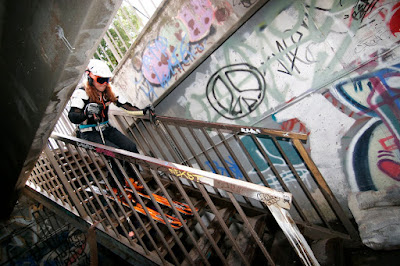Does a dog know the difference between awake and dream?
The floor at the foot of our bed gives one last huge groan as she lies down. Winter releases a giant sigh, relaxing completely, stretched out on her side. During the day she only snoozes, rarely getting into a deep sleep or REM, because she might be called at any moment to accompany us to the store or on a hike. But at night she can finally keep track of us because we will be in one place for a long time.
About the time I finish my fourth page, Winter begins dreaming. She starts quietly at first, a high-pitched wine, coming from far off in the distance, over a hill. Small twitches move her legs. The movements and vocalizations build quickly. At about page six I hear a muffled, “arr-ooff-ooff, arr-ooff-ooff, arr-ooff-ooff,” and her legs rub the carpet in big, jerky movements. It seems that in her dream Winter is in full sprint, barking furiously and chasing something. I almost always chuckle, thinking of her finally catching that squirrel.
But, her REM movements and vocalizations are muted, seeming to emanate from far off, over a hill, in another world. I know it’s another world because she never barks like that in this one. At most she gives one little excited bark when I throw a stick or a ball. Or, when chasing the big grey squirrel in our back yard, her vocalization is low and quiet like a whispered threat.
(Can you find the Dog in this photo?)
Both species (human and dog) have an amazing ability to read emotions. But, a dog’s world is built around associative memories while human’s world is based mainly on interpretation. The ability to interpret means we have more ways to remember (and imagine) events by adding meaning to these events. Naturally, because humans feel our world contains more meaning and it contains more depth.
But, depth and meaning are a human construction, created by us to give our big brains something to do. We add the meaning to the events of our life. Holidays, birthdays, deaths, and disasters are coated in layers of emotional meaning given to us by culture and personal experience.

Dogs add association to the events their lives. When Winter hears her collar jingle as I pick it up she gets excited because she associates the sound with “it’s time to go somewhere.” She doesn’t care where, she just cares that we are going. But, to me, a collar means identification, decoration, ownership, means of restraint and avoidance of a ticket.
The truth is I don’t know what she dreams. If Winter has the ability to distinguish between awake and sleep I doubt she cares because she doesn’t have the need to understand and interpret everything. Dogs exist in the moment.
So why would it matter whether it’s a dream moment or a waking moment to a dog?















